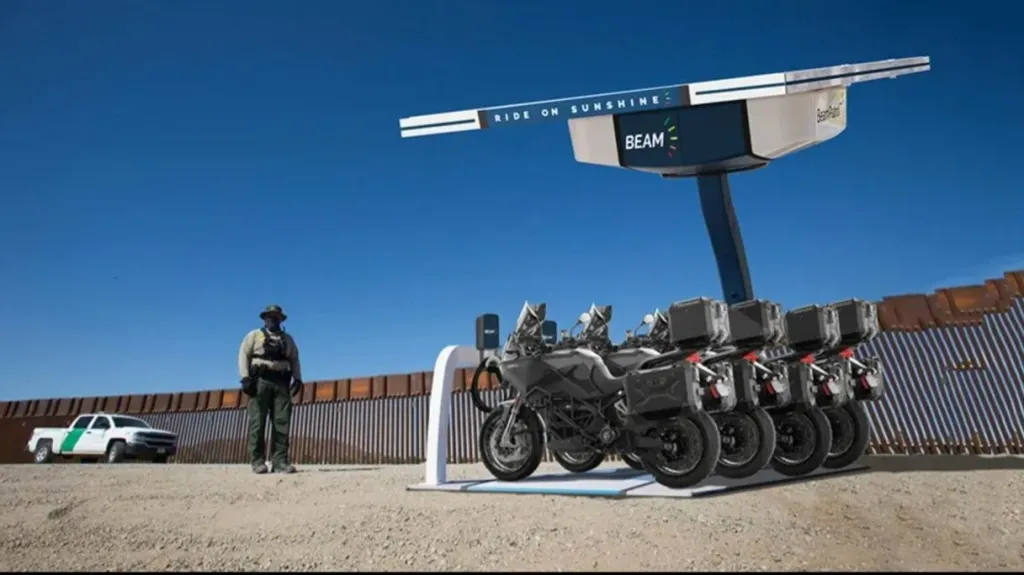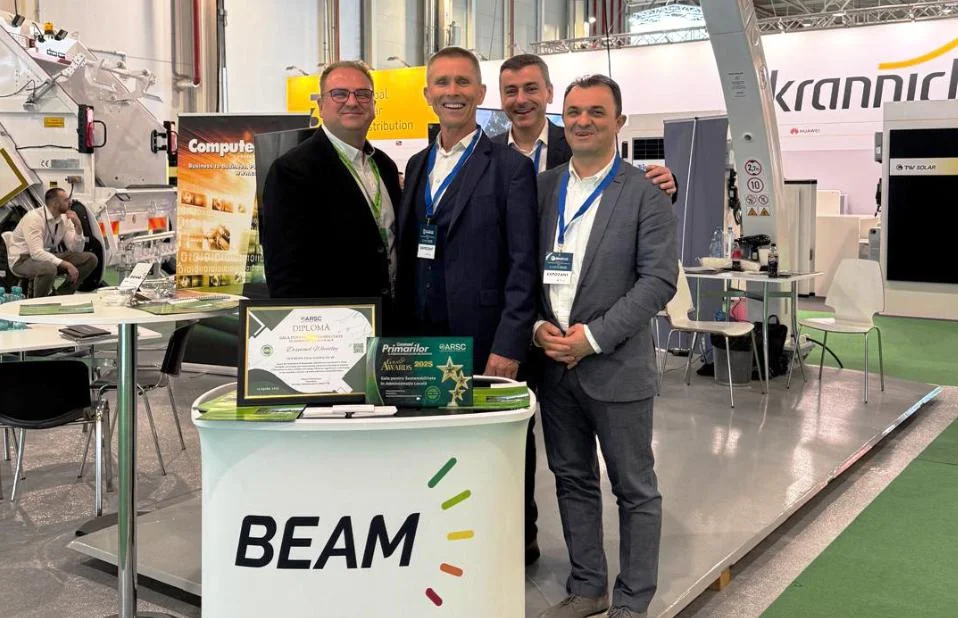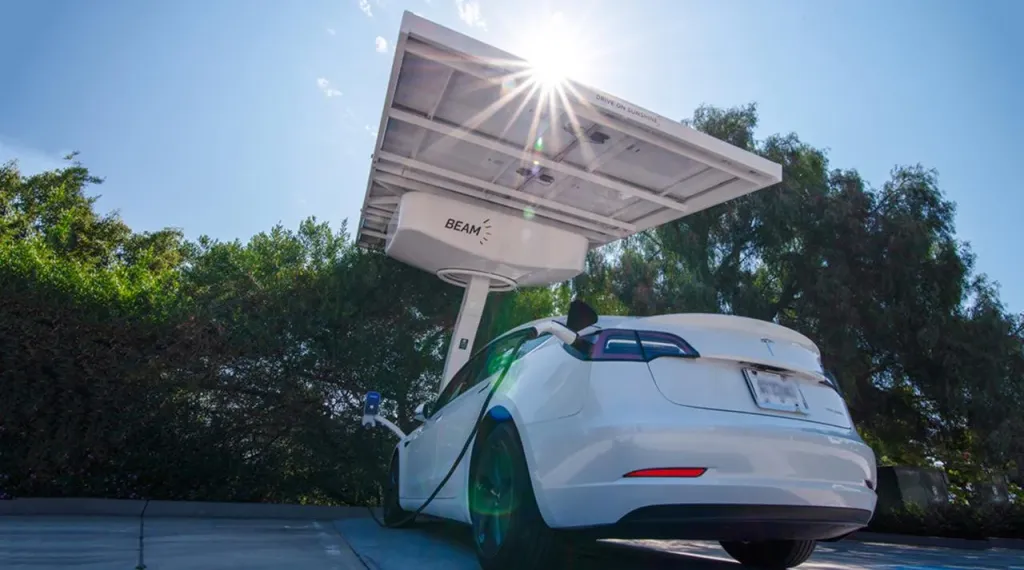'Electric charging will be everywhere': Beam Global head on business plans and the Trump effect

Beam Global CEO Desmond Wheatley has a rich background: he's spent more than 30 years building and running companies of varying sizes, from startups to publicly traded firms with annual revenues of $70 million, listed on his LinkedIn. "For a long time I worked for corporations that polluted the environment. I spent a lot of time in the Middle East working for people I don't support now," he said in an interview with Oninvest.
He then had a career turnaround, moving into the clean energy industry. Wheatley has been at the helm of Beam for 15 years and admits that he still feels much more enthusiastic and energetic than he did in his previous companies.
The company was founded in 2006 by Robert Noble, an architect with degrees from Berkeley and Harvard. It was he who invented the concept of "solar trees" - tree-like devices with solar panels instead of crowns;

Originally called Envision Solar International, the company developed architectural solar structures for parking lots, Whitley explains. He took over in 2011, and under Wheatley's leadership, the company expanded its focus areas. Beam now innovates in sustainable technologies, most of them solar-powered. "We also make batteries, power electronics, products for smart cities and for energy and telecommunications infrastructure," Whitley adds.
The company's main product is the autonomous EV ARC electric vehicle charger. This is a portable charging station with a battery storage unit that runs entirely on solar energy. Its key difference from competitors is that such a station is installed as quickly as possible and does not require construction work, trenching and connection to the power grid;
Desmond Wheatley is the inventor of all Beam products and it is his name that appears on the patents. "I am a person who is good at generating ideas and smart enough to find those who can turn them into reality. We have very talented engineers in our company from the aviation and energy fields. I also have the ability to manage the company's finances, which makes our inventions come to life," he explains.
In 2019, Envision Solar went public and began trading on the Nasdaq at $6 per share.
In September 2020, Envision Solar changed its name to Beam Global. "The name Envision Solar was confusing to both potential customers and Wall Street. People thought we were in the solar panel installation business - a business with low margins and high competition," Wheatley says. And beam means "ray" in English and has many meanings: a beam of energy, a ray of sunshine or even a construction beam;
Wi-Fi for cars
Desmond has his own take on what the infrastructure for electric cars should look like. He cites Wi-Fi as an analogy;
"Ten years ago, Wi-Fi was rare, it was difficult to connect," explains CEO Beam. - Now it is absolutely everywhere: we don't have to think about how to connect to the network, the smartphone often does it automatically".
Another important feature of wireless internet now is the ability to get it for free at many places, such as Starbucks. "Does this Wi-Fi have high speeds, like 1 Gbps? No. If any company now offers to connect to Wi-Fi at that speed for only $10 to $15, everyone will laugh," says Desmond.
This is a good analogy for how electric chargers should work in the future, he explains. Beam's main goal is to make autonomous chargers so that drivers of electric cars will not experience any inconvenience when charging;

In March, Chinese company BYD unveiled a battery system that charges electric cars in just five minutes.
The optimal solution for the development of the electric car market is to make charging as fast as refueling a gasoline car, BYD head Wang Chuanfu commented on the new product;
But Wheatley, though he praises the development by China's BYD, believes such charging stations won't turn the market around. "All of us - from technology providers and inventors to market regulators - need to think about what the driver needs in the future, not what the technology can do," he said.
We need to make charging electric cars similar to charging cell phones, Wheatley believes. According to a study by the Foundation for Traffic Safety, U.S. drivers in 2022 will drive an average of 30.1 miles, or just over 48 kilometers per day. According to CEO Beam, this data is living proof that in most cases it doesn't make sense to charge electric cars very quickly. "We charge our phones as needed while we do other things. One of the big advantages of an electric car is that you don't have to go somewhere specifically and wait, even if it's only 5 minutes, like at a gas station. You can plug into an electric charger while you go to your office, supermarket or park," he explains.
The Donald Trump Effect
Donald Trump's return to the White House in 2025 has shaken up the electric car industry. Trump has never hidden his disdain for the electric transportation industry, but after his inauguration, he moved into action. In the first few days, he, in particular, froze the allocation of state funds for a $5 billion program to build charging stations for electric cars;
"All existing charging stations that are not considered mission-critical should be unplugged and turned off," reads a memorandum dated March 3 on electric vehicle charging stations signed by Michael Peters, the new commissioner of the General Services Administration's (GSA) State Buildings Service.
The GSA is the government agency responsible for promoting green procurement. After Trump became president, the GSA began streamlining its operations: massively shoring departments, and reducing measures to combat climate change.
This came as bad news for Beam Global, Whitley confirms. "Trump's decision will simply set the US back four years from the Chinese, and the country will not benefit from it," he concludes.
Historically, the company's largest portion of revenue has come from contracts with the government; in 2024, they generated 62% of its revenue (vs. 80% in 2023). Its largest customer is the U.S. Army Corps of Engineers. Beam recognized that already in the second half of last year, demand from government clients declined due to political uncertainty.
Wheatley points out that the Trump administration voted not only to stop buying electric cars and chargers, but also to disconnect existing and installed electric chargers. "The GSA told us that this move (disabling installed electric chargers - Oninvest) cost about $1 billion of taxpayer money. It's certainly not economically motivated," he adds. The state shut down stations it had already spent money on.
Beam now sees the salvation of the business in diversification, which it began as early as 18 months ago. At the end of 2023, Beam bought street lighting manufacturer Amiga, and another year later it bought power electronics manufacturer Telcom. Both companies are from Serbia, and the US-based EV maker is making a Beam Europe division out of them. Expansion into Europe benefits Beam - the EU by 2035 plans to produce only zero-emission cars, meaning no gasoline, diesel or gas.
The company has also diversified its product portfolio to no longer depend solely on electric vehicle charging equipment. Beam's other products include BeamBike electric bicycle chargers for bicycles, UAV ARC drones, and a disaster system that includes a water desalination and solar-powered communication access BeamWell.
Stocks are falling
Despite the company's attempts to hedge against political instability in the U.S., its financial results have deteriorated significantly. According to the company's annual report, its revenue in 2024 fell nearly 27%, down from a year earlier, to $49.3 million.Most of the revenue, $37.5 million, came from the U.S.; in the second most important country for business, Serbia, the company generated about $7 million in 2024. Net loss amounted to $11.3 mln, down almost 30% over the year;
"While we expected revenue to be weak, the reality was much bleaker than our initial projections," Freedom Broker analysts wrote in their latest report on the company, released April 16. Analysts had forecast that the company would post revenue of $7.9 million in the first quarter of 2025, down 45% from the same period last year. However, financial results for the first quarter were worse: Beam Global's revenue was $6.3 million, down nearly 57% from a year earlier. The reason for the drop was "uncertainty" in the U.S. government's green transportation strategy, the company explained in a press release. Beam Global did not release its full-year revenue expectations, but analysts at Freedom Global forecast that the company's 2025 revenue will be $37.5 million, down 24% from the previous year.
Beam admits that its performance is still being pressured by reduced demand from U.S. government agencies, but expects a recovery from sales in Europe in the second half of the year. In early May, the company reported a rise in orders for green chargers: despite a drop in demand from federal agencies, Beam had 23% more orders in the first quarter of the year, according to a statement from the service.
In addition, expanding its business in Europe will help mitigate the impact of the duties that Trump imposed this year. Already in the first quarter of the year, the company reported that 25% of its revenue came from international customers - up 14% from a year earlier.
According to Beam's plans, the Serbian plant will provide sales development in the EU, while products for the U.S. market are manufactured in Chicago. Wheatley said the company buys components from around the world, but for U.S. customers it tries to make products from U.S. components. It is focused on the Build America Buy America act, which requires government infrastructure projects to prioritize products made with U.S. raw materials.
Beam is also expanding in the Middle East. In late June, the company announced a joint venture in the United Arab Emirates with investment firm Platinum Group LLC. The companies will create an organization called Beam Middle East LLC, which will sell and manufacture Beam devices.
Since the beginning of the year, Beam's stock has fallen more than 50% to $1.6. Wheatley attributes the drop to an unstable political and economic environment and a general bearish trend. "I follow 30-40 publicly traded companies that are involved in our industry. Some are terrible producers with bad products, poor management teams and lack of discipline. Others are great companies with good products and solid teams. Right now, all of their stock charts look the same," he told Oninvest.
This article was AI-translated and verified by a human editor
